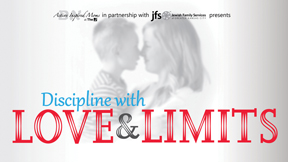
Parents, want to learn something that will matter in 100 years? Attend Barbara C. Unell’s “Discipline with Love and Limits presentation Nov. 14 at the Jewish Community Campus.
Unell, a parent-educator and journalist, has coauthored more than a dozen books on parenting. She has partnered with child psychologist Jerry L. Wycoff, Ph.D., on five of those books. Their latest, “Discipline with Love and Limits: Practical Solutions to Over 100 Common Childhood Behavior Problems,” will be the basis of Unell’s presentation. This book has already sold more than 1 million copies, and the parenting tips Unell will present, she said, will definitely still matter in 100 years.
“What you are doing now and what we are talking about today will actually have an effect long after we are here and long after the folks who we are teaching are here,” Unell said in a recent telephone interview with The Chronicle. “It is extremely exciting to me to understand how we can impact lives for the good for a generation through parenting.”
Unell has been interested in writing since she was in elementary school and “why people are behaving the way they are” for just about as long. She and Wycoff have been collaborating on promoting good parenting practices for 40 years. The pair utilized new brain research as they wrote this book, which is a “reshaped” and bigger version of their best-selling book “Discipline Without Shouting or Spanking,” published in 1984.
Unell explained new research conducted by the Center on the Developing Child at Harvard University has affirmed what she and Wykoff have been teaching for years: Positive parenting can make a difference in the child’s health and future.
“How a parent responds to a behavior can actually make a difference in preventing obesity and helping to prevent such things as depression, anxiety, bullying and heart disease,” she said.
In the book’s preface, Unell and Wykoff write, “Supportive, responsive relationship with caring adults as early in life as possible can mitigate stress so it does not become toxic and lowers the lifetime risk of learning health and behavior problems.”
Wykoff, who also spoke to The Chronicle, said that some believe positive parenting can even eliminate poverty.
“As they grow and develop and become a participant in the greater world, if they have all the tools that they need to do that, then they’ll find jobs, they’ll be able to work and they’ll be able to exercise self-control to regulate themselves,” Wykoff said.
The authors are big believers in setting limits, something that is not new to parenting experts. Unell referred to a favorite quote from the late Fred Rogers of TV’s “Mister Rogers’ Neighborhood” to illustrate that point.
“Disciplining a child includes making rules,” Rogers said. “I prefer to think of this parenting task as ‘setting limits.’ It can be very frightening for a child not to have limits. Not only can the world outside be frightening, but the world inside, the world of feelings, can also be scary when you’re not sure you can manage those feelings by yourself.”
One feeling children are born with, Wykoff added, is empathy. That’s big news when it comes to the hot topic of bullying.
“If we help children enhance that empathy early in their lives then they wouldn’t even think about bullying,” he said. “What unfortunately happens is that parents tend to suppress that empathy and that changes the brain so that it’s no longer available.”
One of the original organizers of the Kindness is Contagious campaign here and the Kindest Kansas Citian Award, Unell thinks it’s interesting that kindness, not bullying, was the bigger topic of discussion 20 to 30 years ago.
“Then we were using words like honesty and respect and responsibility and patience,” she said. “The focus was in building up the positive behavior.”
Building up positive behavior is what Unell and Wykoff do, starting with parents so then the parents can help their children cope with life as it is.
“This diet we’re recommending of teaching positive behaviors and kindness is real and actually changes the brain, but also prevents these other things such as bullying, obesity, depression, anxiety and other public health issues,” Unell said.
“If I could flip a switch on the media,” she added, “I would switch the word bullying to kindness. Every time that someone is talking about an anti-bullying program, I would talk about a kindness program because the more we use these words as parents as well as in the media, the more we’re going to implicate these values into our kids’ lives, and they are going to be more comfortable with it.”
Unell is excited for the opportunity to speak to parents in the Jewish community and is grateful to JFS and The J for recognizing the importance of providing parenting tools.
“We are starting to work with nonprofit agencies, pediatricians and with parents and teachers to engage them in this knowledge and then empower them to use this knowledge to lower their stress and lower the stress of their children so that their health, their learning and their behavior can benefit throughout everyone’s lives,” she said. “Remember that 100 years I talked about? This is the 100-year secret right here. The science is backing us up. They will be learning these tools to help improve learning and behavior of their children, all for the low, low price of free.”
Quick Facts
Author Barbara C. Unell will share her expertise on how to counter common parental problems in a special free presentation at 7 p.m. Thursday, Nov. 14, in the Social Hall of the Jewish Community Campus. The event is jointly sponsored by the Active Inspired Moms (AIM) program of the Jewish Community Center and Jewish Family Services. Those attending will receive a complimentary copy (one per family) of Unell’s new book, “Discipline with Love and Limits,” co-authored with psychologist Jerry L. Wyckoff, Ph.D., courtesy of Bob and Ann Regnier.


